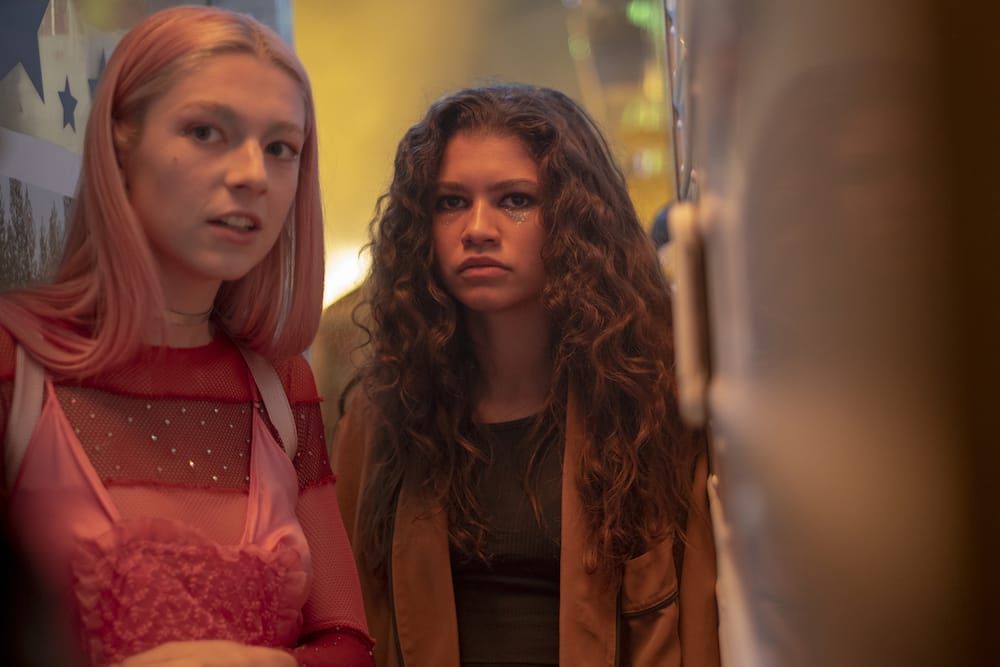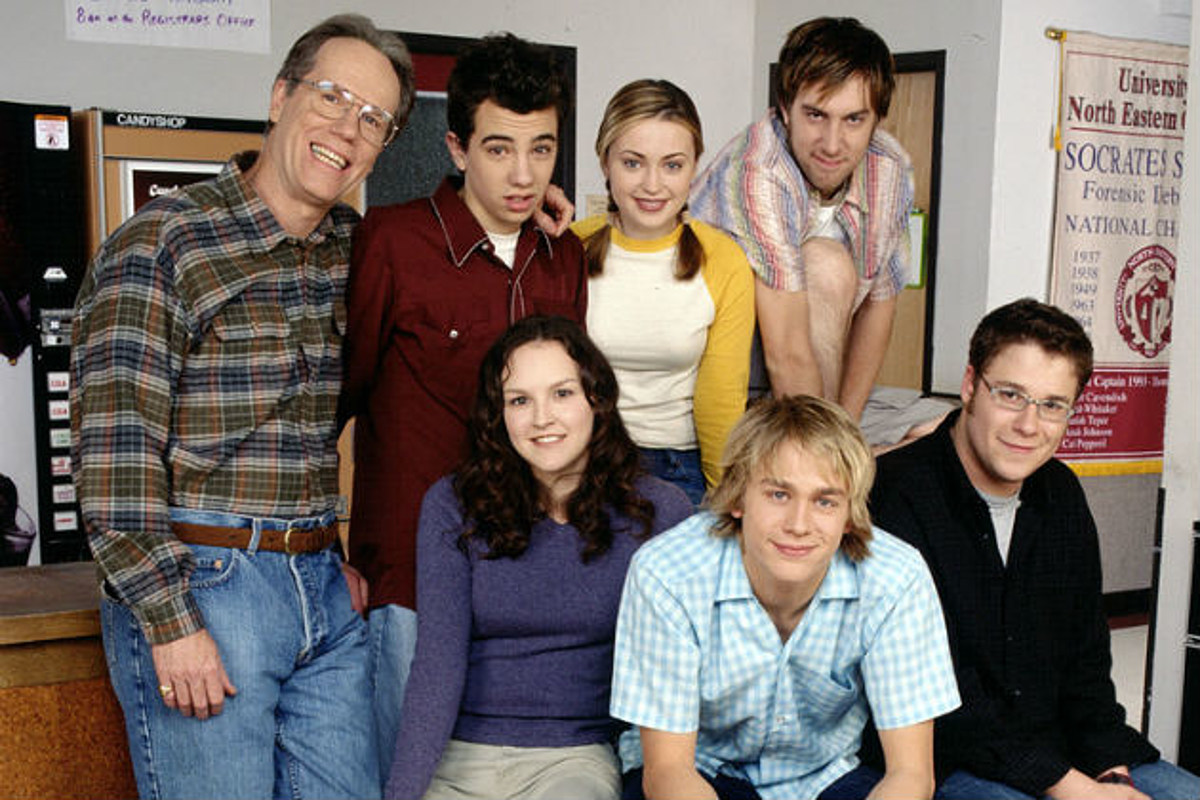Why don't shows about college work?
Shows about 17-year-olds have a long TV history. Shows about 19-year-olds don't. Why?

Over the weekend, a viral tweet asked why, precisely, HBO’s Euphoria was about high-school students instead of college kids. (In the interest of not bringing more grief on the head of someone who wrote a viral tweet, I’m not going to link to it when my summary is, more or less, the tweet in its entirety.)
There are a bunch of things I find worth interrogating in this tweet, not least of which is the sense I get that many folks who talk about popular media on Twitter or Tumblr or whatever want to only watch art that never makes them uncomfortable. That inclination is a wholly defensible personal choice that I really wish wouldn’t be projected outward onto me, someone who kind of hates art designed to “comfort” me, because it so often becomes art designed to placate me. (I went into this more here and here.)
But I think it’s worth taking the tweet at face value as well: Why isn’t this show about college kids? In the case of Euphoria, specifically, I think there are plenty of good creative reasons that Rue and her friends couldn’t be college students. The show would kind of break if Rue had the wherewithal to even barely scrape by in a college setting, since her whole character is defined by aimlessness and refusal to confront her own trauma. If the show were about college students, it would lose the element of moral panic that is its chief appeal to parents (more on this here). And so on.

Look beyond these reasons specific to Euphoria, however, and you land on a wider-ranging issue that seems to be true of television: Shows about college don’t really work, where shows about high school do. There was even a whole “jump the shark” category for high-school shows falling apart once the characters went to college back when that website still existed. You’ll note, for instance, how quickly Buffy the Vampire Slayer stopped really telling stories about the characters in college, seemingly concluding the setting was a narrative dead end. And that show had some of the best writers in TV history!
The conventional wisdom as to why shows about college students struggle is probably also correct. That conventional wisdom says that for the most part, the struggles of adolescence are shared by such a wide swath of people that it’s pretty easy for anybody who’s been a teenager to relate to the characters on teen shows. To be sure, there are some of us who had an “outside looking in” perspective on being a teenager (I’m one of them!), but there are so many people who can relate on some level to the conventional portrayal of TV high school in one way or another that teen shows tend to garner a loyal audience.
What’s more, teen shows tend to succeed across a wide number of genres. Buffy and Veronica Mars and Riverdale and Friday Night Lights and 90210 are all in different genres yet also all sort of in the same genre. It’s not so hard to imagine how Buffy Summers might react to winding up in Dillon, Texas, or how Veronica Mars might handle life in Riverdale. You’d have to shift these characters’ core genres a little bit to get them to fit their new setting, but not all that much. And teen shows tend to have familiar emotional beats across history — the adventures of the kids from Freaks & Geeks are not all that dissimilar from those on something like The Wonder Years.
So Euphoria might be a prestige TV show — Zendaya won an Emmy, after all — but its teen show core is strong enough that if you’ve seen any single one of the shows I just listed, you can probably tap into it. The center of the series, after all, is a passionate love that develops between two teenage girls. “Teenagers falling in love” is such a universal theme that we can’t seem to stop writing about it, and for all of its modern trappings, Euphoria is just about that.
We don’t have similarly universal stories about college, because college is far from a universal experience. My experience at South Dakota State University was significantly different from the experience I might have had if I had gone to Harvard or UCLA or something. And that assumes a person going to college. Lots of people decide to go to a different school, or to go into the military, or to just not go to school at all.
Class is an issue in high school shows, to be sure, but college ramps up the effects of class stratification. Rory Gilmore’s experiences at Yale are wildly different from Annie Edison’s at Greendale Community College, and it’s very hard to imagine Rory in Community (though I can kind of imagine Annie in Gilmore Girls).
College also creates wildly different experiences of classes and activities and interests. High school students are probably all going to take something called “algebra,” but once you get to college, you don’t have to take math classes if you don’t want to. The hyper-specificity this lends the college experience makes it great for more bounded narratives — there are so many great novels set in college — but it’s murder on a TV show that needs to open up wide enough to let everybody in.

Yes, there are college shows. But the most successful ones tend to have very little to do with college. A Different World and Community didn’t really care about their college settings as much as they did the ways those settings gave them a blank slate upon which to tell stories. (And Different World very much wanted to be a show about a very specific college experience, before it became a hangout sitcom with an enormous social conscience.) Dear White People and Greek have college settings that are important to their premises but are also incidental to the main action. Or they just struggle, never quite finding an audience. Even a show as good as Undeclared very much lives in the shadows of everything else its creators made.
What college shows tend to be good at is delving into a very specific setting and the characters or themes inherent to that setting. Dear White People and Community don’t really feel like they belong to the same genre (even though they technically do) because their settings are so vastly different. In short: College shows are much more dependent on setting and theme; high school shows are much more dependent on character and story churn (at least in general).
It seems like “big hit show about college” would be a natural for television, but in a similar fashion to how the newspaper drama never left the shadow of the police, hospital, and legal drama, the college show will forever live in the shadow of the high-school show. There’s just not as much room there to tell stories that will hit as many people in exactly the right way.
So there are a lot of good reasons for Euphoria to be about high-school students instead of college kids, mostly creative. But from a sheer financial standpoint, it’s hugely unlikely HBO would have greenlit the same show about college kids. Too many networks have been down that road before, and almost all of them have been burned.
What I’ve been up to: I’m about to publish something like 17 articles between now and the end of the year at Vox, and I hope you’ll check those out when they start running on Wednesday. But before then, check out my writing for Slate’s TV Club and then check out my appearance on Blank Check with Griffin and David, where I discussed the absolutely terrible 2009 Christmas Carol, directed by Robert Zemeckis.
https://open.spotify.com/embed/episode/2o84VIfBQNi4aXToMbBccf
Read me: This piece on the anger over reviews of the new video game Cyberpunk 2077 is terrifically written and persuasively argued, by the great John Walker. It’s not just about video game reviews; it’s kind of about everything in our culture right now, if you go looking for it.
Of course, the far bigger issue is that a loud proportion of Cyberpunk 2077 purchasers (and indeed any other big-name game) don’t want reviews at all. They want reassurance. They paid for this game nearly two years ago, for whatever illogical reason (“I’m supporting the massive multi-million dollar company!”), for no gain, no extra content, no early access, no bonus items, and they want to know they did the right thing. And, for some, paying for a years-away game is just the start of the sort of self-imposed brainwashing that causes someone to switch from being A Person Who Pre-Ordered A Game They Want To Play to being A Fan. They’ve not only irrationally invested money, but since then have been investing their emotion. They’ve read everything they can find to read about it, hooked up to the PR drip-feed of information that comes both direct from the publisher and the compliant sites that report it all to their readers. This emotional investment mutates into a form of loyalty, a belief that they are now on the game’s side, and a slight against the game is now a slight against themselves.
So what is a review other than a criticism of their own loyalty, and financial and emotional investment? If the review is suitably rhapsodic, then they too are vindicated and praised. If a review steps even slightly out of line, even vaguely critiques aspects of the product, then it’s a personal attack. It’s wounding.
Watch me: I haven’t actually watched the show Bluey on Disney+, but maybe if I mention it in this blurb, the Bluey stans will leave me alone????
Is the dog… Australian? What’s happening here?
And another thing… This is the most predictable thing I could possibly say, but — I adore the Hadestown Christmas album, and you should check it out too!
This week’s reading music: “Campus” by Vampire Weekend
Episodes is published once per week and is about whatever I feel like that particular week. Suggest topics for future installments via email or on Twitter. Read more of my work at Vox.




